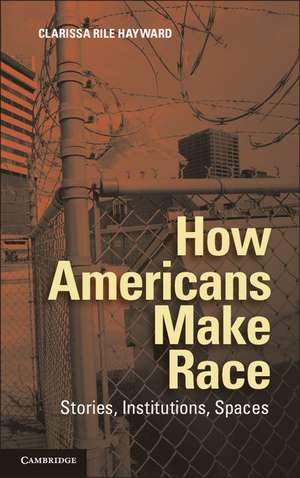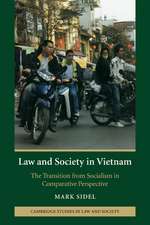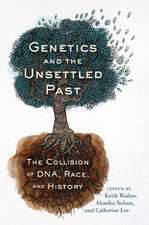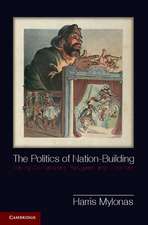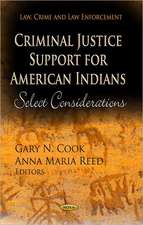How Americans Make Race: Stories, Institutions, Spaces
Autor Clarissa Rile Haywarden Limba Engleză Paperback – 30 oct 2013
| Toate formatele și edițiile | Preț | Express |
|---|---|---|
| Paperback (1) | 155.66 lei 3-5 săpt. | |
| Cambridge University Press – 30 oct 2013 | 155.66 lei 3-5 săpt. | |
| Hardback (1) | 628.54 lei 6-8 săpt. | |
| Cambridge University Press – 30 oct 2013 | 628.54 lei 6-8 săpt. |
Preț: 155.66 lei
Nou
Puncte Express: 233
Preț estimativ în valută:
29.79€ • 31.18$ • 24.79£
29.79€ • 31.18$ • 24.79£
Carte disponibilă
Livrare economică 10-24 martie
Preluare comenzi: 021 569.72.76
Specificații
ISBN-13: 9781107619586
ISBN-10: 1107619580
Pagini: 226
Dimensiuni: 152 x 226 x 20 mm
Greutate: 0.3 kg
Ediția:New.
Editura: Cambridge University Press
Colecția Cambridge University Press
Locul publicării:New York, United States
ISBN-10: 1107619580
Pagini: 226
Dimensiuni: 152 x 226 x 20 mm
Greutate: 0.3 kg
Ediția:New.
Editura: Cambridge University Press
Colecția Cambridge University Press
Locul publicării:New York, United States
Cuprins
Introduction. Comme il faut; 1. Identities and stories; 2. Black places; 3. Ordinary stories; 4. Home, sweet home; 5. White fences; Conclusion: stories, institutions, and spaces; Appendix. Interview respondents and interview schedule.
Recenzii
“For some unknown reason, social scientists focus almost obsessively on the construction of and borders between identities. They pay much less attention to the question of "so what?" – why identities matter in the public realm and in the exercise of political power. Clarissa Hayward is an expert in the ways that power is manifested and used in everyday activities, and she brings that expertise to bear in How Americans Make Race. Identities matter because they are embedded in institutions that matter, and everything from the course of American history to the course of an individual's life chances is shaped by the ways in which "who we are" becomes elided with "what we can do." This is a subtle, moving, important book.” – Jennifer Hochschild, Henry LaBarre Jayne Professor of Government, Harvard University
"In her characteristically trenchant prose, Clarissa Hayward demonstrates how the racialized narrative of Americans as a home-owning people is institutionalized and reproduced through material forms. From the Great Migration of Southern blacks to Northern and Midwestern cities to the contemporary moment, she traces the myriad ways that state actors have supported private, profit-oriented residential development to the benefit of the already well-off. A must-read for any student of race, power, and democracy." – Sarah Song, Professor of Law, University of California at Berkeley
“In this extraordinary and subtle book, full of moving, vivid, and unsettling detail, Clarissa Hayward argues that Americans learn the common sense of race – "racial stories" – by acting and interacting in racialized space. She shows us how to change those spaces so we can live better stories: by targeting exclusionary zoning, regional tax, and local housing policy. This is a compelling position.” – Danielle Allen, UPS Foundation Professor, Institute for Advanced Study
“Through historical analysis and in-depth interviews, Hayward develops a compelling theory of how dominant narratives, institutionalized practices, and material structures combine to reproduce racial identities and racial inequality. Through clever thought experiments, she highlights the tragic implications of these race-making processes for social justice. The result is a highly original, sophisticated, and insightful account of racial dynamics by one of our leading theorists of social power.” – Tommie Shelby, author of We Who Are Dark: The Philosophical Foundations of Black Solidarity and Professor of African American Studies and Philosophy, Harvard University
"In How Americans Make Race, Clarissa Hayward incisively illuminates how and why Americans have constructed grotesquely segregated metropolitan areas that foster vile fables of racial differences and harsh realities of racial inequalities. A riveting and all-too-persuasive analysis." –Rogers M. Smith, Christopher H. Browne Distinguished Professor of Political Science, University of Pennsylvania
"In her characteristically trenchant prose, Clarissa Hayward demonstrates how the racialized narrative of Americans as a home-owning people is institutionalized and reproduced through material forms. From the Great Migration of Southern blacks to Northern and Midwestern cities to the contemporary moment, she traces the myriad ways that state actors have supported private, profit-oriented residential development to the benefit of the already well-off. A must-read for any student of race, power, and democracy." – Sarah Song, Professor of Law, University of California at Berkeley
“In this extraordinary and subtle book, full of moving, vivid, and unsettling detail, Clarissa Hayward argues that Americans learn the common sense of race – "racial stories" – by acting and interacting in racialized space. She shows us how to change those spaces so we can live better stories: by targeting exclusionary zoning, regional tax, and local housing policy. This is a compelling position.” – Danielle Allen, UPS Foundation Professor, Institute for Advanced Study
“Through historical analysis and in-depth interviews, Hayward develops a compelling theory of how dominant narratives, institutionalized practices, and material structures combine to reproduce racial identities and racial inequality. Through clever thought experiments, she highlights the tragic implications of these race-making processes for social justice. The result is a highly original, sophisticated, and insightful account of racial dynamics by one of our leading theorists of social power.” – Tommie Shelby, author of We Who Are Dark: The Philosophical Foundations of Black Solidarity and Professor of African American Studies and Philosophy, Harvard University
"In How Americans Make Race, Clarissa Hayward incisively illuminates how and why Americans have constructed grotesquely segregated metropolitan areas that foster vile fables of racial differences and harsh realities of racial inequalities. A riveting and all-too-persuasive analysis." –Rogers M. Smith, Christopher H. Browne Distinguished Professor of Political Science, University of Pennsylvania
Notă biografică
Descriere
This book looks at why people keep using identities even after the stories from which they were constructed have been rejected.
